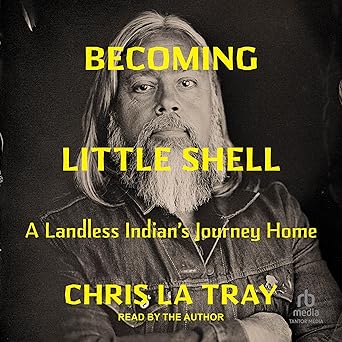
Growing up in Montana, Chris La Tray always felt a strong connection to his Indigenous roots, despite his father's denial of any connection. He would often hear his grandmother mention their Chippewa heritage, and he found himself drawn to the rich history and culture of Indigenous people. However, as he grew older, he began to question the identity he had always accepted, wondering about the relatives he never got to know and why he was never allowed to learn about his true heritage.
La Tray's journey to discover his family's past is a powerful exploration of the complicated history of Indigenous communities and the devastating effects of colonialism that continue to impact surviving generations. Through diligent research and meaningful conversations with experts, authors, and elders, he uncovers a story that is both deeply personal and historically significant. As he digs deeper, he begins to understand the ways in which his family's history is intertwined with the struggles of the Little Shell Tribe of Chippewa Indians, who have been fighting for federal recognition for an astonishing 158 years. This struggle is not just about politics, but about identity, belonging, and self-determination.
As La Tray comes to terms with his own identity and finds a sense of belonging, he also sheds light on the importance of storytelling, family, and legacy in shaping our understanding of ourselves and our place in the world. Becoming Little Shell is more than just a story about one person's journey; it is a testament to the power of resilience, the importance of preserving cultural heritage, and the need for ongoing conversations about colonialism and its ongoing impact. The book is infused with candor, heart, wisdom, and a deep love for the land and the people that Chris La Tray encountered on his journey.
I recently had the privilege of reading a book that has left an indelible mark on my heart. The story is one of self-discovery, identity, and the struggle for recognition that has been ongoing for generations. The author's personal journey is deeply intertwined with the history of the Indigenous people, and as I turned the pages, I found myself drawn into a world that was both familiar and yet, utterly foreign.
Growing up, I have always been fascinated by the stories of my own heritage, and I know that this book will resonate with anyone who has ever felt a deep connection to their roots. The author's journey is not just about finding answers, but about shedding light on the complexities of colonialism and its ongoing impact on Indigenous communities. I was struck by the author's courage in sharing his personal story, and the way in which he weaves together history, family, and legacy to create a narrative that is both deeply personal and historically significant. The more I read, the more I wanted to know about the author's ancestors and the world they inhabited.
One of the most striking aspects of this book is the way in which it sheds light on the importance of storytelling in preserving cultural heritage. The author's conversations with experts, authors, and elders are woven throughout the narrative, providing a rich tapestry of perspective and insight. As I turned the pages, I found myself reflecting on my own relationships with my own heritage, and the ways in which our stories shape our understanding of ourselves and our place in the world. The author's journey is a powerful reminder that identity is not just about who we are, but also about where we come from, and the people who have shaped us along the way. This book is a testament to the power of resilience, and a call to action for ongoing conversations about colonialism and its ongoing impact.
Rating: 4.0 / 5.0
I recently had the privilege of reading a book that has left an indelible mark on my heart. It's a powerful story of self-discovery, identity, and the struggle for recognition that has been ongoing for generations. The author's personal journey is deeply intertwined with the history of Indigenous people, and as I turned the pages, I found myself drawn into a world that was both familiar and yet, utterly foreign. This book is a testament to the power of resilience and a call to action for ongoing conversations about colonialism and its ongoing impact. The author's courage in sharing his personal story shines through, shedding light on the complexities of colonialism and its impact on Indigenous communities.